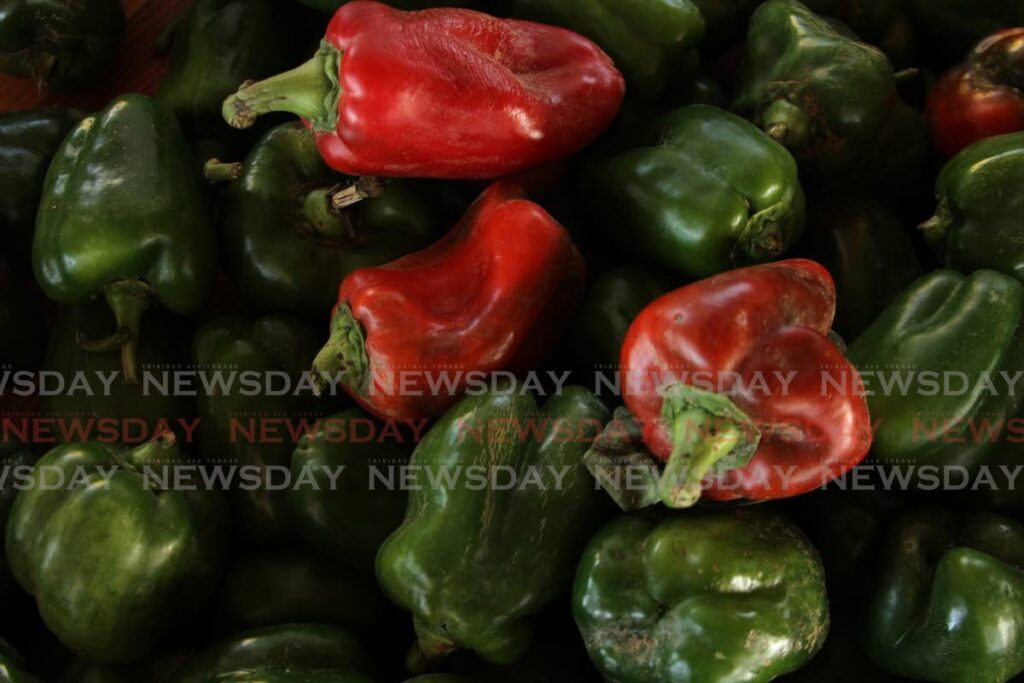Farmers: Sweet pepper shortage coming, prices going up

Consumers are being warned to brace for a shortage in agricultural produce as the heat is forcing farmers to choose between feeding the nation and minimising their losses.
Head of the Aranguez United Farmers Association Satyananad Maharaj told Newsday that the heat was wreaking havoc on farmers who now faced increased costs, more pests and reduced water for irrigation.
“Brace for a shortage of a lot of market goods and short crops that come out of the farms down here. If this type of weather continues, farmers may decide to save their money rather than plant and lose their labour and capital,” Maharaj warned. He said produce such as sweet pepper, tomatoes and cauliflower might be in short supply in the coming weeks if the heat wave continued.
“Short crops like sweet peppers, tomatoes and things like that which are easily spoilt by heat and water. These are things that will suffer the most.
“Anything that is subject to burning in the sun you will have problems, especially if this is followed by heavy rain.”
Maharaj said farmers had accepted the situation and were dealing with it as best they could.
“It’s not something you can solve. You can’t run with blanket and cover your produce, so we will get heavier losses due to the sun burning the crops.”
He added that farmers would look at the situation and might simply decide to cut their losses early on.
“A farmer will look at how much he is making as opposed to what he is losing and may hold back on planting just not to incur that loss.”
Maharaj said one of the biggest issues apart from the heat was water shortages.
“We almost in a drought-like situation. The water sources are depleted so it is difficult getting water to the crops and they require more frequent irrigation because of the amount of evaporation taking place.”
He added that it was also impractical to pay for the delivery of the amount water needed to irrigate a farm. He said farmers had contributed funds toward clearing watercourses in the Aranguez area to aid in irrigation but that was a double-edged sword.
“Farmers will chip in and get the backhoe and clean the watercourse hoping that the rains really come but not in a fury because that same channel you are cleaning might be the reason for you losing your crops.”
Mahraj said clearing the watercourses had also put them in hot water with WASA.
“We are always at risk of WASA looking to take our pumps. That’s something they threaten to do quite regularly (because) farmers have to pay for water. Water is not free. They expect you to pay for wastewater in this country, water that would normally run out into the swamp or the sea.”
He said the heat was also contributing to an increase in pests.
“The heat we are having is also going to affect the amount of pests and pesticide we have to use to control pests. There is that something that happens in the heat, pests, those that affect crops tend to multiply faster.”
He said those costs added up.
“It will cost us more not just in terms of labour but also in terms of capital output to bring your goods to market. We are taking it hard.”
He said consumers would see a shift in prices soon.
“These goods are not fixed price and the market will fluctuate depending on supply and demand.
“Already we have seen some of smaller market sheds not buying some of the goods because it will cost them too much and they also have to accept a certain amount of loss while waiting to retail their goods so some are preferring to not invest as heavily.
“The consumer will eventually pay the price for it.”
Terrence Haywood of the National Foodcrop Farmers Association issued a similar warning to consumers saying the shortage “could be trouble.
“Just now it will start to raise up. We have Divali coming up. And people will want plenty pumpkin, and pumpkin takes plenty land and it ain’t have no water.
“You know what could happen? Pumpkin cud raise up to $10 (per pound) again.”
Haywood said some crops might remain in abundance but would face a price increase.
“Chive expensive because Paramin doesn’t have water, and cabbage will be expensive because they also bring most of the cabbage. We may get some baigan but it wouldn’t be the same quality it used to be.”
He said rainfall was the only thing that might save consumers from impending price increases.
“If rain start to fall it mightn’t be so bad because the plants might catch back themselves.”
Haywood said the market would have to regulate itself.
“Remember it’s just market forces we go by. When it have plenty, you getting it cheap because we don’t have a price structure. So we have to go with the quantity and quality.”
Head of the Supermarket Associaion Rajiv Diptee said supermarkets would continue to support local farmers but added that consumers still had the final say.
“The stores will still continue to support the farmers as we have done in the past. We reiterate our commitment to supporting local farmers and local producers. However we do so in the interest of the customer at this time.”
He added, “If a product is placed at a price point that is beyond the customer, the consumer has the ultimate purchasing power to say, ‘We are not buying it at this price.’ Stores then have to make a decision whether to continue or discontinue carrying certain products at certain prices.”


Comments
"Farmers: Sweet pepper shortage coming, prices going up"